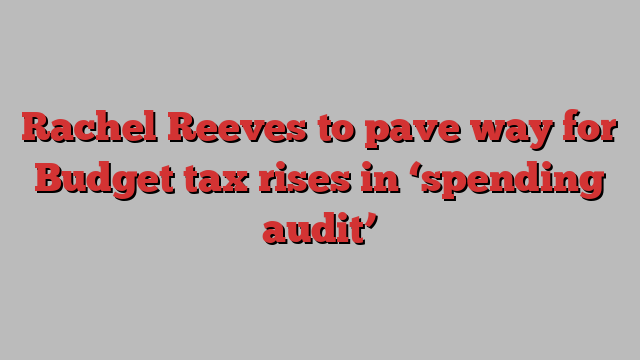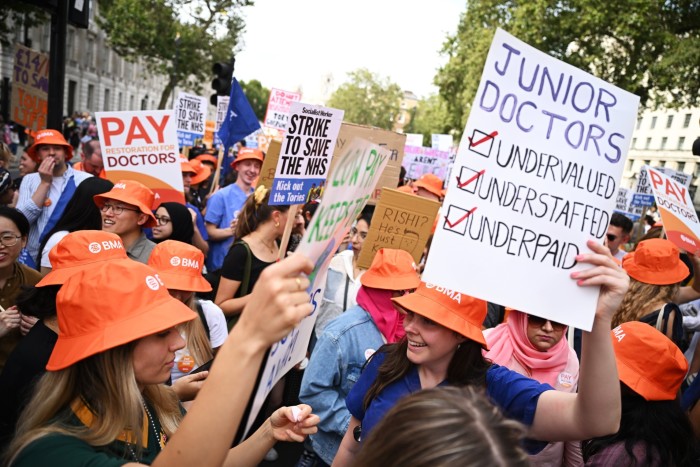
Chancellor Rachel Reeves will pave the way next week for a tax-raising autumn Budget, blaming pressures on public sector pay, the NHS, prisons, defence and other public services for what she calls “tough decisions”.
Sir Keir Starmer hinted at painful fiscal announcements on Wednesday, the prime minister saying his government was facing “a more severe crisis than we thought as we go through the books” with “failure absolutely everywhere”.
Rishi Sunak, the previous prime minister, has denounced Reeves’s “spending audit” — to be delivered in a House of Commons statement on Monday — as mere political cover for announcing billions of pounds in tax rises that he claims Labour had always planned.
The wealthy are likely to be in the line of fire after Reeves sets out what she claims to be the full extent of the “Tory mess”. One analyst said it was plausible that taxes could rise by £10bn-£25bn.
Higher levies on capital gains and inheritances, alongside cuts to pension tax relief, are among the few big tax-raising levers Reeves can pull, since she has ruled out increasing income tax, national insurance, VAT or corporation tax. Those four taxes account for 75 per cent of government revenues.
Labour insiders insist that the Office for Budget Responsibility, which publishes analysis of the public finances, was unable to see the “short-term pressures” on public services that Reeves’s audit will unearth.
The Treasury declined to rule out tax rises in her first autumn Budget to fill in this supposedly unforeseen spending hole.
“The chancellor has commissioned officials to provide an assessment of the state of the government’s spending inheritance which will be presented to parliament before the summer recess,” it said.
Reeves is expected to make the statement on Monday, and set out the timing of the Budget and a spending review, after she returns from a meeting of G20 finance ministers in Brazil.
Last week she said the Conservatives had failed “to make the tough decisions and it’s now up to us to fix it”.
Government insiders point to pressures on the NHS, particularly in hospital building, which one said was “unfunded and based on unrealistic timelines”.
Others noted pressures on defence, prisons and advanced manufacturing, alongside compensation bills for the infected-blood scandal and postmasters hit by the Horizon IT scandal.
The biggest single problem facing Reeves is public sector pay, after independent reviewers recommended rises of 5.5 per cent for NHS and school staff, well above the 3 per cent expected by the Treasury.

If that kind of increase were extended to the entire public sector, the bill could reach an extra £10bn a year compared with a 2 per cent baseline, said Ben Zaranko, economist at the Institute for Fiscal Studies.
That alone would wipe out the fragile £8.9bn of “headroom” against the government’s borrowing rules bequeathed by former Conservative chancellor Jeremy Hunt in his March Budget.
Unless the OBR significantly upgrades its growth forecasts — widely seen as unlikely — or Reeves cuts public spending deeply, tax rises will be needed to keep the public finances on track.
Her audit will deepen doubts over existing plans for annual Whitehall departmental day-to-day spending growth of just 1 per cent in real terms for the remainder of the parliament.
Forecasters including the IMF have already said that figure is unrealistically tight because of the pressure for improvements in public services and for more capital spending.
Among other demands, governments across Europe are under pressure to further boost defence spending in response to the threat from Russia and an “America first” strategy if Donald Trump wins the White House.
All this implies the need for some steep tax increases, analysts warned. “We suspect the new chancellor will ‘kitchen sink it’, getting all the fiscal bad news out early on,” said Michael Saunders at consultancy Oxford Economics.
He added that one plausible scenario was that the review would be used to justify “significant” extra tax increases of £10bn-£25bn. That would be in addition to the £8.6bn of revenue-raising measures set out in the manifesto.
Investors have said they would be sanguine if Reeves tried to create further budgetary headroom by adjusting the measure of debt used in the government’s fiscal rule. Inherited from the Tories, this demands that public debt as a share of GDP is falling on a five-year horizon.
It could be altered to eliminate the impact of losses by the Bank of England on sales of bonds bought as part of its quantitative easing programme, which supported the economy after successive shocks between 2009 and 2022.
That measure alone would save the Treasury about £17bn, according to JPMorgan bank, and take Reeves’s budget headroom against the fiscal rule to almost £26bn.
Even if she were to make no change, a possible dialling-back in the pace of bond sales by the BoE over coming years could ease the upward impact on the debt ratio.
Among Reeves’s tax options is a big increase in capital gains tax, with one potential measure being to equalise rates charged on gains made from selling assets with rates of income tax and indexing gains to inflation. But Zaranko of the IFS said this would probably not raise more than £10bn a year.
Axing agricultural and business reliefs and bringing pension pots within the scope of inheritance tax could raise up to roughly £1.5bn a year, he added.
Reducing the amount of tax relief on pension savings for higher earners — a policy long favoured by the Treasury but politically very contentious — would also deliver significant gains.